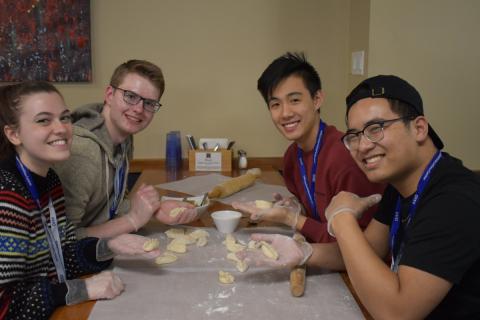Greetings from Hong Kong!
Checking in with Remote Learners
Kate Luksha
Wednesday, November 4, 2020

Marco Yan (second from right) making dumplings as part of the Global Leadership Experience in January 2020.
This one goes out to the students studying remotely. It has not been easy to adjust to completely online learning, spending hours a day on Zoom, faces behind the screens of your laptops, trying to keep up with the demands of your classes, battling quarantine fatigue, as well as different time zones to get the work done.
Kai Hei Marco Yan is one such student studying remotely from his home country of Hong Kong this semester. He, along with many other international students, elected to study from home in an effort to reduce the spread of COVID-19.
I checked in with Marco at the end of September, just ahead of the Mid-Autumn Festival, which fell on October 1 this year. Marco explained, “The Mid-Autumn Festival is one of the biggest festivals celebrated in Chinese culture. People will gather with their extended families for a big dinner. After dinner, families will find a place outside to sit and observe the full moon. Kids will be holding lanterns of various shapes and teenagers or even adults will be burning candles. Mooncakes are also an essential part of the festival; we would gift them to family members and friends.”
Because Marco was home studying, he and his family were able to celebrate Mid-Autumn Festival together, despite the strict measures taken by Hong Kong officials to slow the spread. Because of these strict measures, such as being fined for not wearing a mask or breaking the maximum gathering restriction, the number of cases in Hong Kong has remained relatively low.
I asked Marco how he was adjusting to studying remotely and attending classes virtually with such a huge time difference (12 hours) and he explained that although he misses many aspects of normal college life, the overall experience has been better than he expected. “The time difference is a huge factor, but many of my professors are kind enough to let me watch pre-recorded lectures and complete quizzes and exams outside of class time.”
After these past many months in quarantine, we can all attest that quarantine fatigue is indeed real and it can strike at any time, but there are ways we can stave it off. “Staying at home most of the time makes me start to get lazy and the willingness to work goes down.” Marco said he was able to solve this problem by implementing time management and organizing his time more efficiently. He has been scheduling specific time for watching lectures and completing assignments.
When we think about the pandemic, we often think of all the things it has taken from us. I asked Marco if there was anything positive he has learned from this experience. He said, “I think that over the course of being in isolation, I have taken on more responsibility for my schoolwork. I no longer attend physical classes, so there is no set time I must spend studying. In this case, I must take more responsibility on myself to plan out my schedule and daily objectives in order to keep up in all my classes.”
Marco realized the dedication it takes to study remotely, and he stepped up to the task. One of the good things born from this pandemic is that it has forced us to step back and take stock of our strengths. It has shown us we are capable of so much more than we realize.
Right now, there are students studying remotely all over the world missing the buzz of campus life, fighting quarantine fatigue to keep up with their classes, and wondering when it will be safe to return to campus.
We hear you. We miss you. And we can’t wait to see you all again very soon. Until then, keep up the good work and feel free to reach out to oiss@unh.edu if you need support.
WRITTEN BY: Kate Luksha | Global Education Center | kate.luksha@unh.edu
